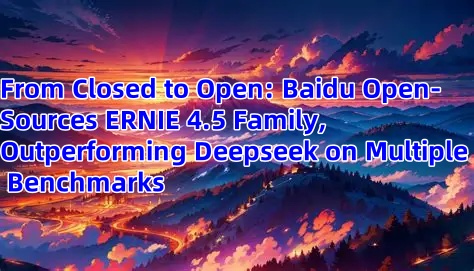In a groundbreaking move, Baidu has announced the open-source release of its latest ERNIE 4.5 (Enhanced Representation through kNowledge IntEgration) large language model (LLM) family, sending shockwaves through the AI industry. Licensed under Apache 2.0, this release allows global developers to freely use, modify, and commercialize the models—a major shift from Baidu’s previous closed-source strategy.

Baidu’s Strategic Pivot: Embracing Open-Source AI
Previously, Baidu positioned ERNIE as a proprietary, commercial-grade AI, competing directly with OpenAI’s ChatGPT. Robin Li, Baidu’s CEO, had previously advocated for closed-source models at the 2024 World AI Conference (WAIC) in Shanghai. However, the rapid rise of open-source competitors like Deepseek—which gained international recognition for its high-performance LLMs—has forced Baidu to rethink its approach.
ERNIE 4.5: A Comprehensive Open-Source AI Suite
Baidu’s ERNIE 4.5 series includes 10 variants, ranging from a lightweight 300M-parameter model to a massive 424B-parameter Mixture-of-Experts (MoE) model capable of activating 47 experts.
Key Highlights:
-
ERNIE-4.5-300B-A47B-Base outperforms Deepseek-V3-671B-A37B-Base in 22 out of 28 benchmark tests, marking a significant milestone for Chinese AI models.
-
However, Baidu has not yet released direct comparisons against OpenAI’s GPT-4, Anthropic’s Claude, or Google’s Gemini, leaving its global standing somewhat unclear.
-
The company is reportedly developing “X1”, a heavyweight model aimed at competing with Deepseek’s R1, though it remains closed for now.
Beyond the Models: Baidu’s Full Open-Source Ecosystem
Baidu isn’t just releasing models—it’s building an open-source AI ecosystem. The release includes:
-
ERNIEKit: A developer toolkit for fine-tuning and deploying ERNIE models.
-
FastDeploy: Optimized tools for low-cost, high-efficiency AI deployment, making it accessible for SMEs and individual developers.
Industry Impact: The Open-Source AI Domino Effect
Baidu’s move is part of a larger trend reshaping the AI landscape:
-
Deepseek’s rise challenged the dominance of closed-source models, prompting even OpenAI CEO Sam Altman to hint at future open-source releases—a major shift from OpenAI’s strictly proprietary approach since 2019.
-
Experts suggest that each major open-source release raises industry standards, forcing competitors to innovate faster.
Conclusion: A New Era of Open AI Competition
Baidu’s ERNIE 4.5 open-source release is more than just a product update—it’s a strategic disruption that:
-
Empowers developers with free, high-performance AI models.
-
Challenges Big Tech’s control over advanced AI systems.
-
Accelerates global AI adoption by lowering barriers to entry.
As open-source AI gains momentum, the battle between closed and open models intensifies—with Baidu and Deepseek leading China’s charge, while OpenAI and Google face growing pressure to adapt.
